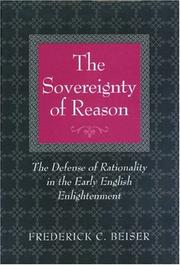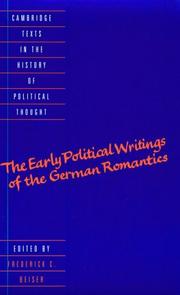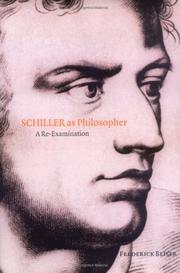| Listing 1 - 10 of 41 | << page >> |
Sort by
|
Book
ISBN: 9780198722205 0198722206 0191789054 Year: 2014 Publisher: Oxford Oxford university press
Abstract | Keywords | Export | Availability | Bookmark
 Loading...
Loading...Choose an application
- Reference Manager
- EndNote
- RefWorks (Direct export to RefWorks)
Frederick C. Beiser tells the story of the emergence of neo-Kantianism from the late 1790s until the 1880s. He focuses on neo-Kantianism before official or familiar neo-Kantianism, i.e., before the formation of the various schools of neo-Kantianism in the 1880s and 1890s (which included the Marburg school, the Southwestern school, and the Göttingen school). Beiser argues that the source of neo-Kantianism lies in three crucial but neglected figures: Jakob Friedrich Fries, Johann Friedrich Herbart, and Friedrich Eduard Beneke, who together form what he calls 'the lost tradition'. They are the first neo-Kantians because they defended Kant's limits on knowledge against the excesses of speculative idealism, because they upheld Kant's dualisms against their many critics, and because they adhered to Kant's transcendental idealism. Much of this book is devoted to an explanation for the rise of neo-Kantianism. Beiser contends that it became a greater force in the decades from 1840 to 1860 in response to three major developments in German culture: the collapse of speculative idealism; the materialism controversy; and the identity crisis of philosophy. As he goes on to argue, after the 1860s neo-Kantianism became a major philosophical force because of its response to two later cultural developments: the rise of pessimism and Darwinism.
History of philosophy --- anno 1800-1899 --- anno 1700-1799 --- Germany --- Neo-kantianism. --- Philosophy, Modern --- Néo-kantisme --- Philosophie --- Kant, Immanuel, --- Influence --- Néo-kantisme --- Influence.
Book
ISBN: 9780198768715 0198768710 Year: 2016 Publisher: Oxford Oxford University Press
Abstract | Keywords | Export | Availability | Bookmark
 Loading...
Loading...Choose an application
- Reference Manager
- EndNote
- RefWorks (Direct export to RefWorks)
Weltschmerz is a study of the pessimism that dominated German philosophy in the second half of the nineteenth century. Pessimism was essentially the theory that life is not worth living. This theory was introduced into German philosophy by Schopenhauer, whose philosophy became very fashionable in the 1860s. Frederick C. Beiser examines the intense and long controversy that arose from Schopenhauer's pessimism, which changed the agenda of philosophy in Germany away from the logic of the sciences and toward an examination of the value of life. He examines the major defenders of pessimism (Philipp Mainländer, Eduard von Hartmann and Julius Bahnsen) and its chief critics, especially Eugen Dühring and the neo-Kantians. The pessimism dispute of the second half of the century has been largely ignored in secondary literature and this book is a first attempt since the 1880s to re-examine it and to analyze the important philosophical issues raised by it. The dispute concerned the most fundamental philosophical issue of them all: whether life is worth living.
Philosophical anthropology --- History of philosophy --- Philosophy and psychology of culture --- anno 1800-1899 --- Germany --- Pessimism --- Philosophy, German --- History --- Pessimism - Germany - History - 19th century --- Philosophy, German - 19th century

ISBN: 0415312078 0415312086 9780415312073 9780415312080 9780203087053 9781134383870 9781134383917 Year: 2005 Publisher: New York (N.Y.) Routledge
Abstract | Keywords | Export | Availability | Bookmark
 Loading...
Loading...Choose an application
- Reference Manager
- EndNote
- RefWorks (Direct export to RefWorks)
Hegel, Georg W.F. --- Philosophie. --- Hegel, Georg Wilhelm Friedrich, --- Hegel, Georg Wilhelm Friedrich. --- Hegel, Giorgio Guglielmo Frederico --- Hegel, Georg Wilhelm Friedrich --- Hēgeru, --- Hei-ko-erh, --- Gegelʹ, Georg, --- Hījil, --- Khegel, --- Hegel, G. W. F. --- Hegel, --- Hei Ge Er, --- Chenkel, --- Hīghil, --- הגל, --- הגל, גאורג וילהלם פרידריך, --- הגל, גיאורג וילהלם פרידריך, --- הגל, ג.ו.פ, --- היגל, גורג ווילהלם פרדריך, --- היגל, גיורג וילהלם פרידריך, --- 黑格尔, --- Hegel, Guillermo Federico, --- Hegel, Jorge Guillermo Federico, --- Heyel, Georg Wilhelm Friedrich, --- Higil, Gʼūrg Vīlhim Frīdrīsh, --- هگل, --- هگل، گئورگ ويلهم فريدريش,

ISBN: 0674257278 Year: 1992 Publisher: Cambridge, Mass. Harvard University Press
Abstract | Keywords | Export | Availability | Bookmark
 Loading...
Loading...Choose an application
- Reference Manager
- EndNote
- RefWorks (Direct export to RefWorks)
Political philosophy. Social philosophy --- anno 1700-1799 --- Germany --- 141.13 --- Conservatism --- -Liberalism --- -Philosophy, German --- -Romanticism --- -Pseudo-romanticism --- Romanticism in literature --- Aesthetics --- Fiction --- Literary movements --- German philosophy --- Liberal egalitarianism --- Liberty --- Political science --- Social sciences --- Conservativism --- Neo-conservatism --- New Right --- Right (Political science) --- Sociology --- Metafysisch idealisme --- Politics and government --- -Conservatism --- Liberalism --- Philosophy, German --- Romanticism --- -Metafysisch idealisme --- 141.13 Metafysisch idealisme --- -141.13 --- -141.13 Metafysisch idealisme --- Pseudo-romanticism --- -Political philosophy. Social philosophy --- 1740-1806 --- Philosophy [German ] --- 18th century --- Germany - Politics and government - 1740-1806. --- Liberalism - Germany. --- Romanticism - Germany. --- Conservatism - Germany. --- Philosophy, German - 18th century.

ISBN: 0691033951 1306984130 Year: 1996 Publisher: Princeton, N. J. ; Chichester, UK Princeton University Press
Abstract | Keywords | Export | Availability | Bookmark
 Loading...
Loading...Choose an application
- Reference Manager
- EndNote
- RefWorks (Direct export to RefWorks)
Enlightenment --- Reason --- Philosophy, English --- Philosophy & Religion --- Philosophy --- English philosophy --- Philosophy, British --- Mind --- Intellect --- Rationalism --- Aufklärung --- Eighteenth century --- Philosophy, Modern --- History --- 18th century --- Philosophy [English ] --- England --- Enlightenment - England. --- 165.63 --- 930.85.48 --- 930.85.48 Cultuurgeschiedenis: Verlichting; Aufklärung --- Cultuurgeschiedenis: Verlichting; Aufklärung --- 165.63 Rationalisme. Intellectualisme. Aufklärung. Verlichting. Enlightenment --- Rationalisme. Intellectualisme. Aufklärung. Verlichting. Enlightenment
Book
ISBN: 9780199691555 019969155X 0191731838 Year: 2011 Publisher: Oxford : Oxford university press,
Abstract | Keywords | Export | Availability | Bookmark
 Loading...
Loading...Choose an application
- Reference Manager
- EndNote
- RefWorks (Direct export to RefWorks)
Historicism. --- Philosophy, German --- Historicisme --- Philosophie allemande --- Philosophie politique --- Histoire --- Philosophy, German. --- 1800-1899. --- Historicism --- History --- Philosophy --- Histoire.
Book
ISBN: 9780199682959 Year: 2013 Publisher: New York, NY : Oxford University Press,
Abstract | Keywords | Export | Availability | Bookmark
 Loading...
Loading...Choose an application
- Reference Manager
- EndNote
- RefWorks (Direct export to RefWorks)
Idealism, German --- Philosophy, German --- Idéalisme allemand --- Philosophie allemande --- History --- Histoire --- Lotze, Hermann, --- Trendelenburg, Adolf, --- Philosophie --- Lotze, Rudolf Hermann, --- Trendelenburg, Adolf Friedrich, --- Idéalisme allemand --- Trendelenburg, Adolf Friedrich --- Idéalisme allemand.

ISBN: 0521449510 0521445019 1139170600 9780521449519 Year: 1996 Publisher: Cambridge : Cambridge University Press,
Abstract | Keywords | Export | Availability | Bookmark
 Loading...
Loading...Choose an application
- Reference Manager
- EndNote
- RefWorks (Direct export to RefWorks)
The Early Political Writings of the German Romantics contains all the essential political writings of Friedrich Schlegel, Schleiermacher and Novalis during the formative period of romantic thought (1797 to 1803). While the political thought of the German romantics has been generally recognised as important, it has been little studied, and most of the texts have been until now unavailable in English. The early romantics had an ambition still relevant to contemporary political thought: how to find a middle path between conservatism and liberalism, between an ethic of community and the freedom of the individual. Frederick C. Beiser's edition comprises all kinds of texts relevant for understanding the political ideas of the early romantic circles in Berlin and Jena - essays, lectures, aphorisms, chapters from books, and jottings from notebooks. All have been translated anew, many for the first time.
Political science --- Romanticism --- History. --- 321.01 --- -Romanticism --- -#GROL:SEMI-32<08> Camb --- Pseudo-romanticism --- Romanticism in literature --- Aesthetics --- Fiction --- Literary movements --- Administration --- Civil government --- Commonwealth, The --- Government --- Political theory --- Political thought --- Politics --- Science, Political --- Social sciences --- State, The --- Algemene staatsleer. Politieke filosofie. Staatsleer. Staatstheorie --- History --- Germany --- Politics and government --- -321.01 --- 321.01 Algemene staatsleer. Politieke filosofie. Staatsleer. Staatstheorie --- -Political science --- #GROL:SEMI-32<08> Camb --- Social Sciences --- Political Science --- Idées politiques --- Political science. --- Politics and government. --- Romanticism. --- Romantisme --- Science politique --- Histoire --- 1740-1806. --- Allemagne --- Germany. --- Politique et gouvernement
Book
ISBN: 9780691173719 9780691163093 069116309X Year: 2014 Publisher: Oxford : Princeton University Press,
Abstract | Keywords | Export | Availability | Bookmark
 Loading...
Loading...Choose an application
- Reference Manager
- EndNote
- RefWorks (Direct export to RefWorks)
Histories of German philosophy in the nineteenth century typically focus on its first half--when Hegel, idealism, and Romanticism dominated. By contrast, the remainder of the century, after Hegel's death, has been relatively neglected because it has been seen as a period of stagnation and decline. But Frederick Beiser argues that the second half of the century was in fact one of the most revolutionary periods in modern philosophy because the nature of philosophy itself was up for grabs and the very absence of certainty led to creativity and the start of a new era. In this innovative concise history of German philosophy from 1840 to 1900, Beiser focuses not on themes or individual thinkers but rather on the period's five great debates: the identity crisis of philosophy, the materialism controversy, the methods and limits of history, the pessimism controversy, and the Ignorabimusstreit. Schopenhauer and Wilhelm Dilthey play important roles in these controversies but so do many neglected figures, including Ludwig Buchner, Eugen Duhring, Eduard von Hartmann, Julius Fraunstaedt, Hermann Lotze, Adolf Trendelenburg, and two women, Agnes Taubert and Olga Pluemacher, who have been completely forgotten in histories of philosophy. The result is a wide-ranging, original, and surprising new account of German philosophy in the critical period between Hegel and the twentieth century.Review: "This is an invaluable exercise in broadening one's historical and cultural understanding; one should think twice about the traditional view that 1840-1900 is a period of only transforming Hegelianism into Marxism and Existentialism. Ironically, then, Beiser's lesson about the history of 19th century postHegelian Philosophy in Germany is a Hegelian one. The traditional narrative is onesided, and one ought to be thankful for the clear and engaging way Beiser reveals this."--Paul Giladi, Marx and Philosophy "Beiser is arguably the most prolific and informative historian working on nineteenth-century German philosophy in the English language today... [His] work is to be commended for its clarity of writing, historical accuracy and scholarly research.
Philosophy, German --- Hegel, Georg Wilhelm Friedrich, --- Philosophie --- Philosophy --- anno 1800-1899 --- Germany --- History of philosophy --- Philosophie allemande

ISBN: 9780199282821 019928282X 0191603066 0199532311 9786612185908 0191536121 128218590X 142375333X 9781423753339 9780191536120 9780191603068 Year: 2005 Publisher: Oxford : New York : Clarendon Press ; Oxford University Press,
Abstract | Keywords | Export | Availability | Bookmark
 Loading...
Loading...Choose an application
- Reference Manager
- EndNote
- RefWorks (Direct export to RefWorks)
to follow
Aesthetics --- Schiller, Friedrich, --- Aesthetics. --- Beautiful, The --- Beauty --- Esthetics --- Taste (Aesthetics) --- Philosophy --- Art --- Criticism --- Literature --- Proportion --- Symmetry --- Psychology --- Schiller, Jean Christophe Frédéric --- von Schiller, Friedrich --- von Schiller, --- von Schiller, Johann Christoph Friedrich --- Schiller, Friedrich --- Swillŏ, Pʻŭridŭrihi, --- Hsi-lo, --- Shiler, Fridrikh, --- Schiller, Friedrich von, --- Shiller, Fridrikh, --- Schiller, Johann Christoph Friedrich von, --- Schiller, Frederick, --- Hsi-le, --- Shiller, F. --- Schiller, Frideriko, --- Šileri, Pʻridrix, --- Šileris, Frydrichas, --- Schiller, J. C. F. von --- פריגריך פאן שיללער, --- שיללער --- שיללער פריעדריך --- שיללער, פרידריך --- שיללער, פרידריך, --- שיללער, פ., --- שילער, פרידריך --- שילער, פרידריך, --- שילר, יוהן כריסטוף פרידדריך פון, --- שילר, יוהן כריסטוף פרידריך פון, --- שילר, פרידריך --- שילר, פרידריך, --- שילר, פ. --- שלר, פרידריך, --- Schiller, J. C. Friedrich von --- Radio broadcasting Aesthetics --- Schiller, Friedrich, - 1759-1805
| Listing 1 - 10 of 41 | << page >> |
Sort by
|

 Search
Search Feedback
Feedback About UniCat
About UniCat  Help
Help News
News